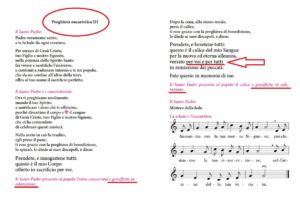After an unwilling journey that lasted 16 years, the new edition of the Editio typica is printed in Italian: But what about the change words pro multis?
(Rome) Pope Francis gave the green light to publish the new edition of the Editio typica of the Missale Romanum in the Italian vernacular. The Italian daily Avvenire, published an article without mentioning the most important point that led to the new edition: the translation of the words of change pro multis.
An oversight may be excluded. First, the article in its central passage:
The Italian re-translation of the Missale is ready to enter parishes of the peninsula. There is still no sure date, but the pope’s "green light" has been given. During the first day of the Spring Bishops' Conference of the Italian Episcopal Conference, Cardinal Gualtiero Bassetti, President, announced to the bishops that Francis would be pleased to announce the publication of the third edition of the Missal Romanum by Paul VI. in Italian. The Italian text was examined by the Congregation for the Divine Worship and the Sacrament Order for the necessary confirmatio. It is still too early to know when some formulas will change that celebrate the Eucharist in our language. It will probably take several months for the "renewed" liturgical book to come into force.
The new translation was decided last November by the General Assembly of the Bishops. Among the innovations introduced are those of the Lord's Prayer: we will no longer say, "and lead us not into temptation,” but "let us not fall into the temptation." In addition, in the same prayer the insertion of a "also" provided ("as are forgiven"). [1] In this form, the text of the Our Father already appears in the new Italian translation of the Bible, adopted by the Episcopal Conference in 2008, and has already been incorporated into the renewed Italian edition of the Lectionary, where the classic "peace on earth to men of good will" replaced by the new version “Peace on Earth to the people beloved by God."
The changes take place at the end of a path that lasted more than 16 years.
John Paul II’s and especially of Joseph Cardinal Ratzinger and later Pope Benedict XVI. desire was to bring the translations into the vernacular as close as possible to the Latin original. The first Italian edition of the Editio typica came into force in 1970 and implemented the liturgical reform. The deficits of this translation made the second edition necessary already in 1975. It is still in use today, though in the translation from 1983. Now it is replaced by the third edition.
Benedict XVI. in 2006, soon after his election as Pope, he ordered that the words of consecration pro multis should no longer be translated as "for all" but as "for many". On the other hand, there was some strong resistance, especially from the German Bishops’ Conference and the Italian Bishops' Conference. After six years, 2012, Benedict XVI. insisted again, and the same in German. By the time of his resignation his directive could be further delayed.
While other language areas have been publishing and using the new edition for several years, nothing has changed in the German and Italian-speaking world. 13 years after Benedict XVI. had prescribed a more faithful translation, pro multis it is still rendered as "for all" in German and Italian churches. The mills of the church are slow to grind is the old dictum, but in this specific case, it is about willful procrastination resembling a boycott.
In the Avvenire article it is striking that the central point of the revision of the Editio typica was Benedict XVI’s re-translation of pro multis, is not mentioned. In some ecclesiastical circles even this legacy of Benedict XVI seems to be a thorn in the eye, which is why they prefer to remain silent.
Text: Giuseppe Nardi
Image: Avvenire (screenshot)
[1] This "too" is already included in the German version.
Trans: Tancred vekron99@hotmail.com
AMDG




